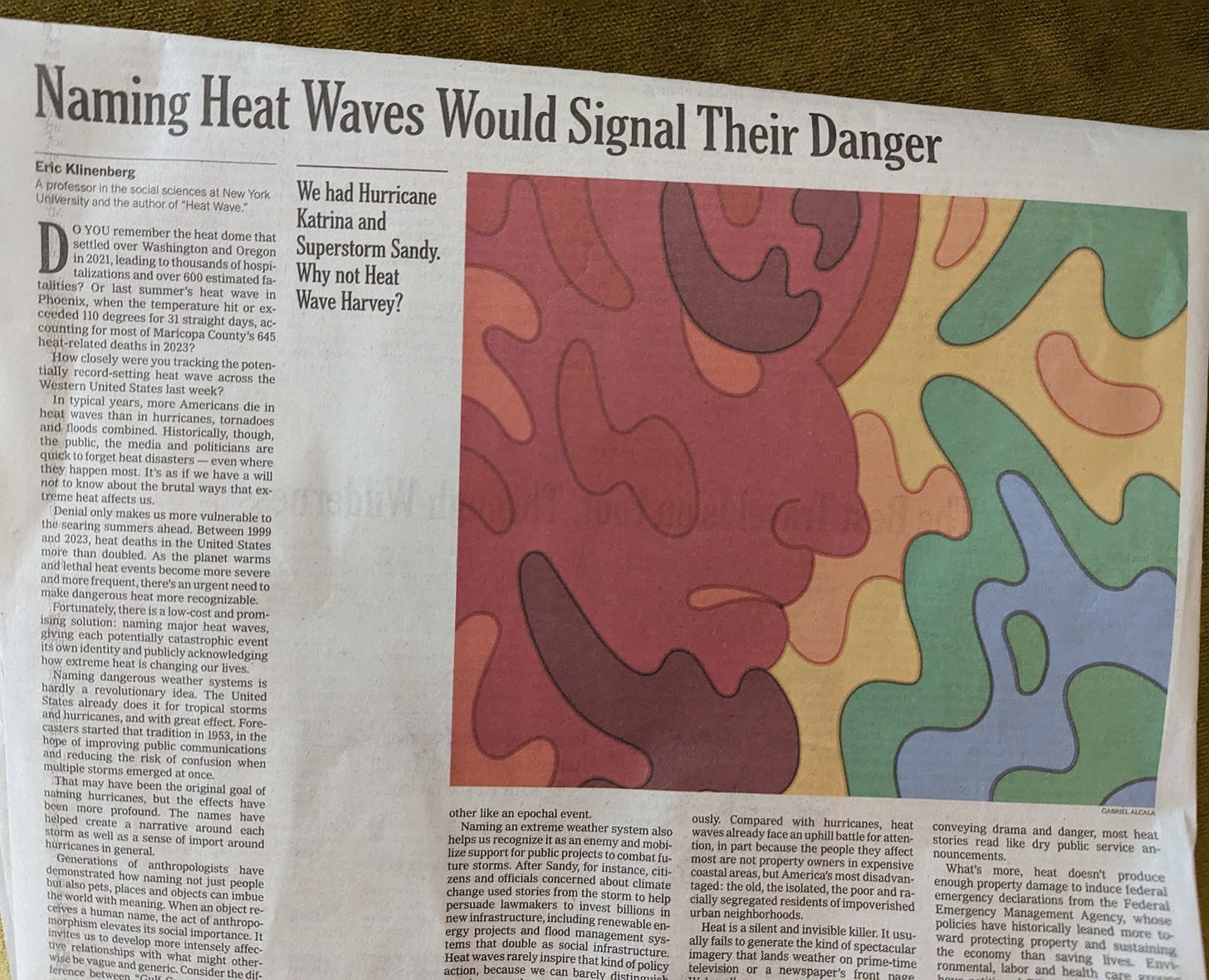It isn’t often that serious stories about names make it into the New York Times — or any newspaper — and it’s especially rare to find two essays about names in the same section of the paper on the same day. So I was naturally impressed by how much space was devoted in last Sunday’s Opinion section to my favorite subject.
Here’s the first op-ed, by Eric Klinenberg:

“Naming dangerous weather systems is hardly a revolutionary idea,” writes Klinenberg, a sociology professor at New York University and the author of Heat Wave. U.S. weather forecasters began assigning women’s names to tropical storms and hurricanes in 1953 and added men’s names in 1979; the goal was “improving public communications and reducing the risk of confusion when multiple storms emerged at once.”
But there was a “more profound” effect, Klinenberg says. “The names,” he writes, “have helped create a narrative around each storm as well as a sense of import around hurricanes in general”:
Naming hurricanes but not heat waves leaves no doubt about which threat our government, culture and society take more seriously. Compared with hurricanes, heat waves already face an uphill battle for attention, in part because the people they affect most are not property owners in expensive coastal areas, but America’s most disadvantaged: the old, the isolated, the poor and racially segregated residents of impoverished urban neighborhoods.
Some cities in Greece and Spain have already begun naming heat waves — Seville was the first, in 2022, with Heat Wave Zoe — and there’s evidence that people who recall a heat wave’s name are more likely to take safety precautions.
One online Times commenter, Chris Burks, proposed naming heat waves and other climate crises “after politicians and corporations who are responsible for global warming: The 2024 McConnell heat wave. The 2025 Stefanik drought. The 2026 Vance wildfire.”
Here’s another idea: A former Weather Channel meteorologist, Guy Walton, has taken it upon himself to name heat waves after dragons (he called one heat wave “Smaug”) and after oil and gas companies. “I realize what I’m doing is controversial and corporate media will want to steer clear of it, but people need to be riled up,” Walton told The Guardian in July 2023. “I don’t think we need to pull any punches. If it causes consternation, so be it.”
(Related: The names of wildfires, a post I published in 2016.)
Here’s the second op-ed, by Jesse Singal:

It wasn’t, as a 2002 study suggested, that Dennis was more likely to be a dentist than the similarly common Jerry or Walter; it was that Dennis was more likely to be working, since the average Jerry or Walter was older at the time of the study, and therefore more likely to be retired. (Dennis was also more likely to be a lawyer than the other two.)
I agree with Singal that “humans have a powerful drive toward theories that simplify the world and explain outcomes that otherwise seem random.” But I still maintain that there is one area in which implicit egotism — the idea that we prefer people, places, and things that resembles ourselves — is valid: company and product names. My experience as a name developer has shown over and over that people with the power to choose brand nomenclature, especially founders, are drawn to “mirror names.”
As I wrote in 2022:
Over the course of a quarter-century as a name developer, I’ve observed that many founders gravitate toward company and product names that mirror their personal names. The implicit egotism may be sonic — a crisp k sound, a sibilant s — or orthographic, as when the first initial of a founder’s first or last name shows up in the first letter of the company name. The preference is often subconscious; if pressed, a founder may deny it or claim that it’s a coincidence.
Need examples?
In choosing Meta as the name of Facebook’s parent company, Mark Zuckerberg didn’t just reference the metaverse; he also picked a four-letter word beginning with M, just like his own first name. The two Gs in Google are mirrored in the names of the company’s founders, Sergei Brin and Larry Page. Sun Microsystems was founded by Scott McNealy.
For more evidence, read the rest of my Medium story (gift link).
I’m just as susceptible to mirror-naming as those guys. My nom de ’Stack, Fritinancy, embeds my first name and the first three letters of my last name. And yes, it’s a “real word.” It means “the chirping of crickets.”




Parents seem to be more often doing the same thing as business founders, naming their kids with some sonic relationship to their own names. Beyond deliberate continuation of family names or "Jr." and III, etc., the names now—unconsciously?—often start with the same letter or use the same sounds. E.g., Frank and Joan name their kids Jerry and Felicia.
I've known art directors named "Art."
I knew a freelance copywriter named Art Novak. The tagline (which I always liked) on his business card was, "The Art of Copy."